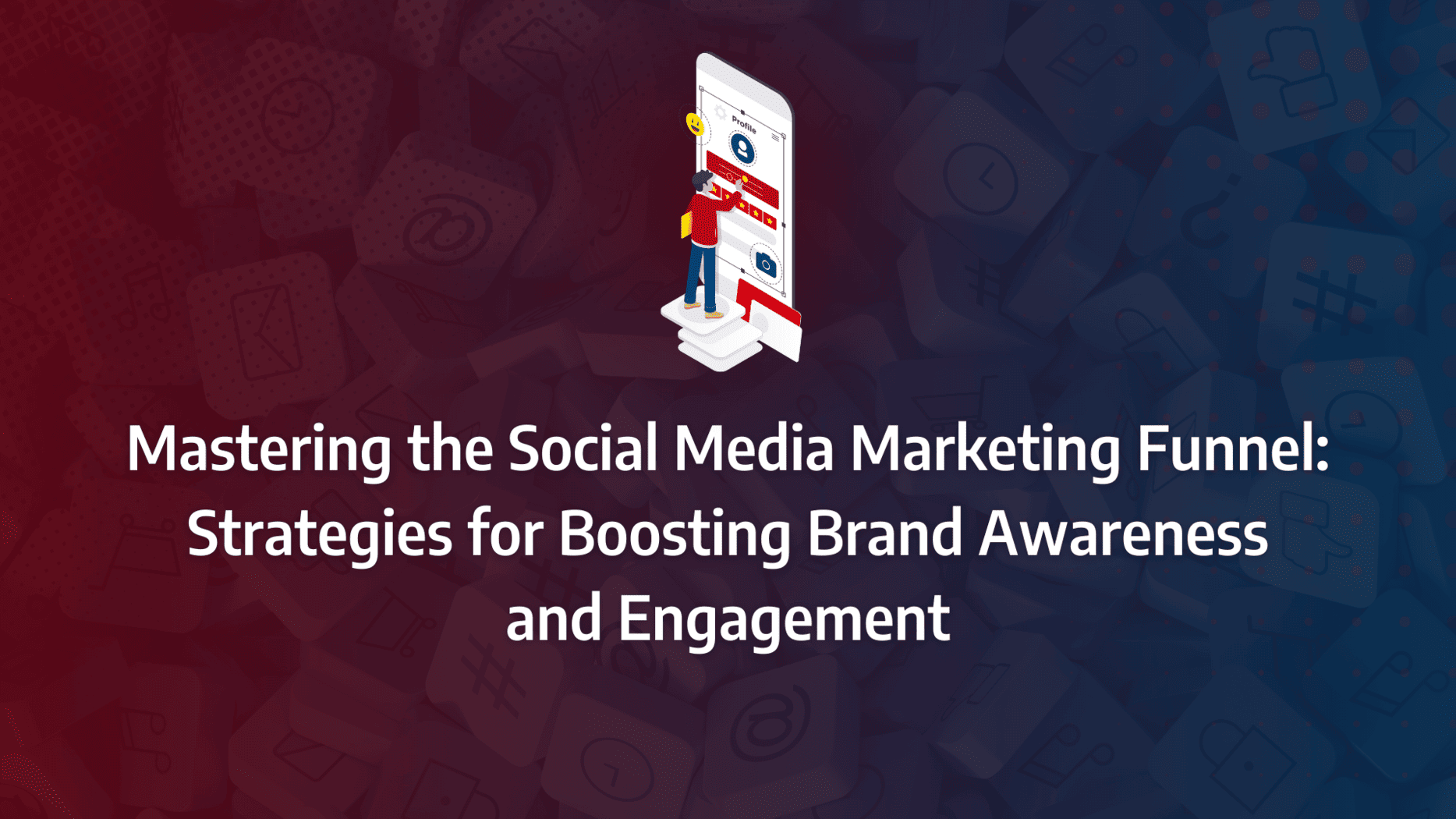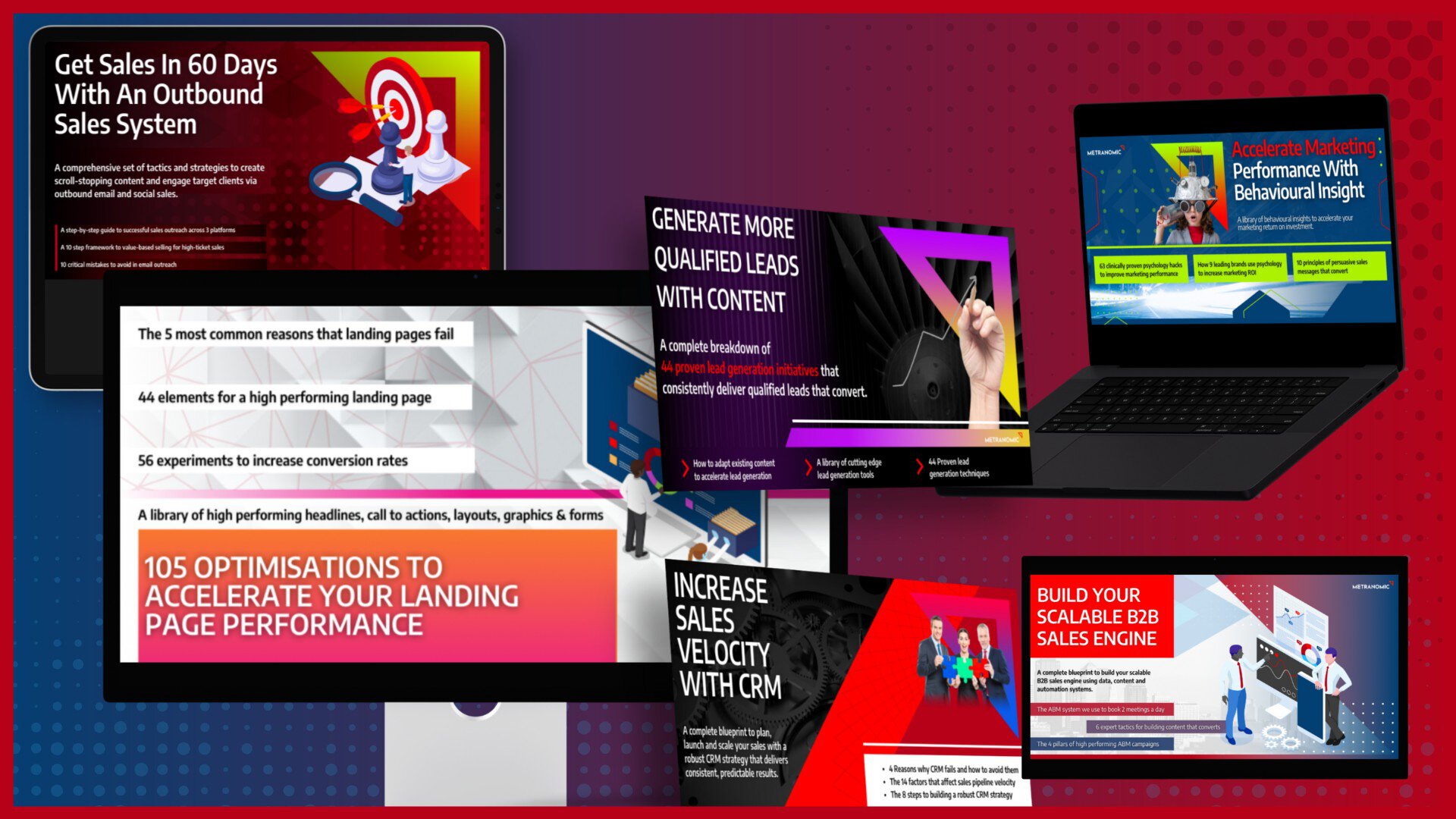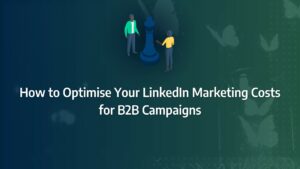The line between engagement and conversion can be razor-thin. Yet, many brands struggle to turn their social media efforts into tangible results.
This blog will guide you through crafting the ultimate social media marketing funnel—one that not only captures attention but drives measurable growth. Uncover actionable strategies, and transform your social media presence into a powerful engine for brand success.
- Understand the Funnel Stages: Recognise the importance of each stage in the social media marketing funnel—awareness, consideration, and conversion—and tailor your strategies accordingly.
- Build Brand Awareness: Use compelling content, influencer partnerships, and targeted ads to broaden your audience and establish a strong brand presence on social media.
- Nurture Leads Effectively: Engage your audience with valuable, relevant content that speaks to their needs, guiding them from awareness to consideration seamlessly.
- Convert with Confidence: Leverage social proof, strong calls to action, and timely promotions to convert your social media followers into loyal customers.
- Measure and Optimise: Continuously track key metrics like engagement and conversion rates using analytics tools to refine and optimise your social media marketing funnel.
The Role of Social Media in a Marketing Funnel
Social media is often utilised to bring awareness to a brand. By leveraging this tool, businesses can enhance awareness and build trust. Additionally, by creating relevant and personalised content, brands can increase engagement, conversion rates, and customer experiences.
Beyond increasing awareness, paid ads are a vital part of any social media marketing funnel. Brands can use Facebook’s tracking and targeting pixels to build personalised audiences who are most likely to react to a campaign. Furthermore, by tracking user interactions, targeting pixels can present the brand to those likely interested in purchasing.
Factors to Consider in a Social Media Marketing Funnel
To maximise the efficacy of a social media marketing funnel, brands must consider their customers’ demographics, needs, and interactions with the business.
Platform Consideration
When planning a social media funnel, consider which platform your customers frequent. Facebook is typically an all-rounder, covering a broad spectrum of customers regardless of interests and demographics. However, for niche businesses, platforms like Instagram or LinkedIn may be more effective.
Providing Value for Customers
Brands should also focus on what their leads value. Whether exploring social media funnel examples or amplifying content marketing, maintaining the interests of leads is crucial. Consumers consistently seek value in what brands offer, making this practice essential.
What Matters Most?
We’ve found that tailoring content to highly specific audience segments typically yields higher engagement rates, particularly in the awareness and consideration stages. Also, adopting a storytelling approach across all social platforms, instead of just pushing sales, can nurture leads far more effectively, resulting in better long-term relationships. Lastly, the importance of social listening cannot be underestimated—it often reveals subtle shifts in consumer sentiment, which can be used to refine messaging and build deeper trust as leads move through the funnel.Get In Touch
Building Your First Social Media Sales Funnel
Creating a successful social media marketing funnel requires a well-thought-out strategy that covers every stage of the funnel. Social media funnels differ slightly from traditional marketing funnels due to the added stages that cater specifically to social media platforms. For example, the evaluation stage is particularly crucial as it allows easy product comparison via social media.
Your social media marketing funnel should address specific questions at each stage. Ignoring any stage can weaken your overall social media funnel strategy. Start with a maximum of two tactics per stage, and once mastered, incorporate new tactics into your marketing plan.
Awareness – How Will Leads Discover Your Brand on Social Media?
Increasing awareness is the first step in building an effective social media marketing funnel. Here are some proven tactics:
- Facebook Live: Engage your audience in real-time.
- Social Media Contests: Use tools like Evalato, Easypromos, and Rafflecopter.
- YouTube and SEO: Attract free subscribers through optimised video content.
- Social Videos: Create engaging videos tailored to Facebook.
- Twitter Reposts: Due to the short lifespan of tweets, repost messages several times, scheduling them 3-5 times a week at different times to reach a wider audience.
- Visual Content: Develop infographics, GIFs, and Twitter cards to capture attention.
- Participate in Groups: Join and engage in Facebook or LinkedIn groups relevant to your industry.
- Repurpose Content: Transform blog posts into visual posts for Instagram or Facebook, posting takeaways or short quotes.
- Interlink Channels: Use social media platforms to add links to other accounts, maximising cross-platform engagement.
- Monitor Mentions: Keep track of brand mentions and organic growth to assess the effectiveness of your tactics.
- Paid Campaigns: Invest in paid social media campaigns and partner with influencers to broaden your reach.
Evaluation – How Will Prospects Compare Your Brand to Competitors?
Awareness alone isn’t enough. Ensure you provide ample case studies, reviews, and credible information to persuade leads. Here are some ways to enhance the evaluation stage of your social media funnel strategy:
- Positive Reviews: Encourage satisfied customers to leave positive reviews on your Facebook Page.
- Linktree on Instagram: Use tools like Linktree to add multiple links to your website and other accounts, making it easy for prospects to explore your offerings.
- Forum Reviews: Engage in forums such as Reddit to gain and share reviews or comments.
- Video Testimonials: Create and share video testimonials from existing customers on your social media accounts.
- Product Catalogues: Showcase your products with high-quality shots on Instagram or Pinterest.
- Remarketing Ads: Use Facebook remarketing ads to re-engage users who have shown interest in your products or services.
By meticulously addressing each stage of the social media marketing funnel and incorporating these specific tactics, you can effectively guide leads through their buying journey, enhancing both sales and profit.
Action – How Can the Brand Get Leads to Buy or Convert?
Leads often require an additional nudge to transition from interest to purchase. Implementing the right social media funnel strategy can significantly boost conversion rates. Here are some effective tactics to encourage conversions within your social media marketing funnel:
- Instagram and Facebook Ads: Utilise ads with timed offers or coupons to create a sense of urgency and entice immediate purchases.
- Email Sign-ups: Convert social media traffic into email sign-ups, allowing for direct and personalised follow-up marketing.
- Purchase Incentives: Organise social media contests with purchase incentives to drive sales while engaging your audience.
- Landing Pages: Create dedicated social media landing pages that are optimised for conversions.
- Remarketing Ads: Use Facebook remarketing ads with compelling offers to re-engage users who have previously shown interest.
- Lead Ads: Implement Facebook Lead ads to capture potential customers’ information directly on the platform.
- Pinterest Buy Buttons: Enable Pinterest buy buttons to facilitate direct purchases from your pins.
Engagement – How Can the Brand Use Social Media Platforms to Keep in Touch with Customers?
Sustaining engagement with customers is vital for nurturing relationships and encouraging future sales. Maintaining an active presence and utilising various social media marketing goals can help achieve this. Here are some strategies to keep customers engaged within your social media marketing funnel:
- Twitter Chats: Host regular Twitter Chats to engage with your audience in real-time, addressing their queries and fostering a community around your brand.
- Facebook Live: Use Facebook Live sessions to interact with customers, answer their questions, and showcase new products or services.
Advocacy – How Can the Brand Encourage Customers to Recommend the Products/Services on Social Media?
Encouraging customers to share their positive experiences is crucial for building trust and attracting new customers. An effective advocacy strategy within your social media marketing funnel can turn satisfied customers into brand ambassadors. Here are some tactics to promote customer advocacy:
- Customer Loyalty Programmes: Build a customer loyalty programme to reward repeat customers and incentivise them to share their experiences.
- Private Facebook Groups: Create private Facebook Groups for customers who have purchased your product, fostering a sense of community and encouraging them to advocate for your brand.
- Customer Communities: Develop customer communities on Instagram to facilitate sharing and interaction among users.
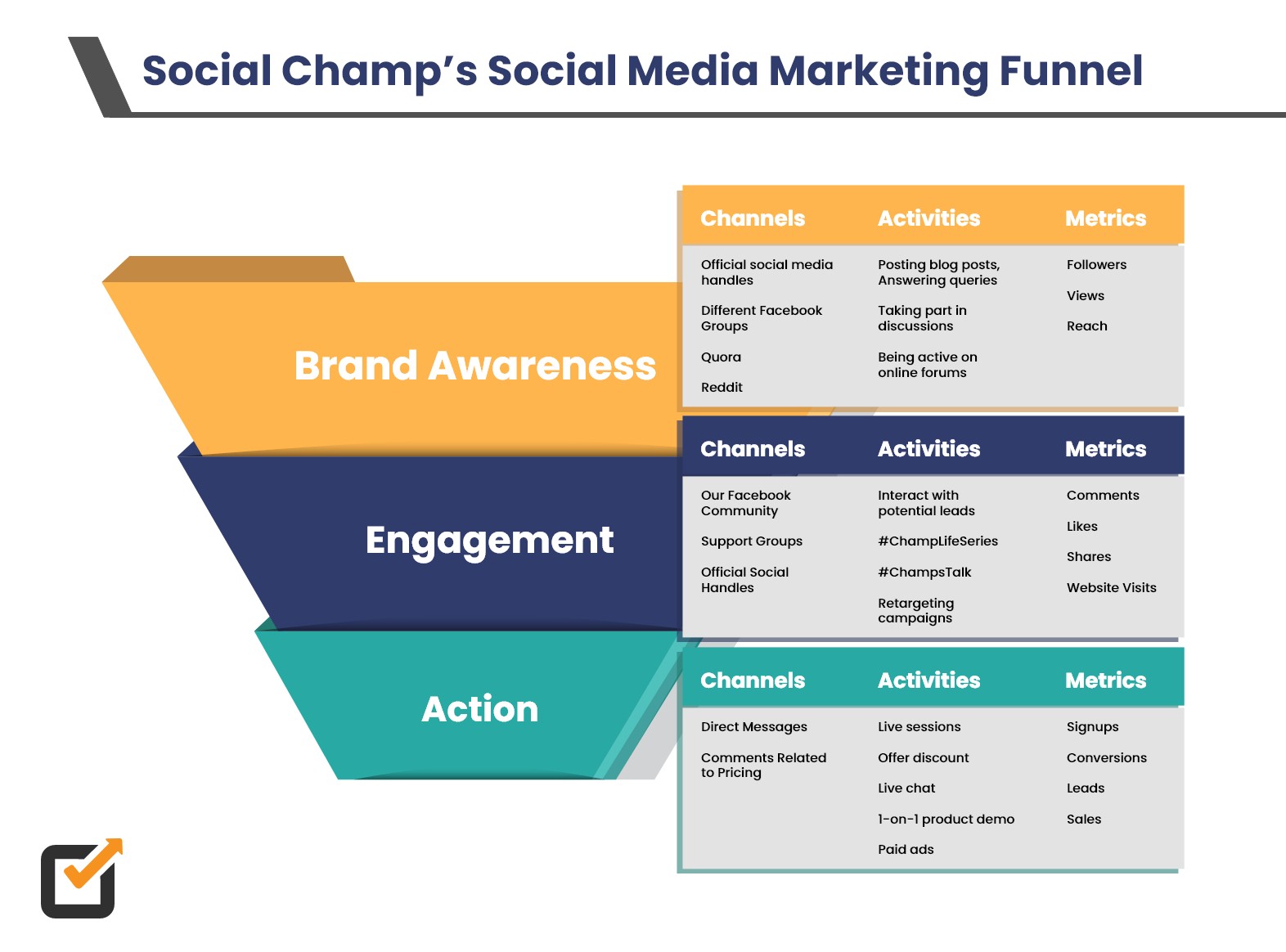
Pitfalls in Social Media Marketing Funnels Every Marketer Needs to Avoid
Navigating the complexities of a social media marketing funnel can be challenging, and there are several critical issues that marketers need to address to achieve tangible results. Here are three significant pitfalls to avoid:
The Consideration Gap
While we excel at the top of the funnel—where awareness and brand engagement are key objectives—we often falter as we move further down the path to purchase. This gap arises when advanced tactics, such as engagement applications, are not integrated with product-focused strategies. Solely focusing on brand awareness creates a consideration gap, missing a crucial piece of the puzzle.
Traditional digital marketing uses ad banners, search, and email to drive customers to e-commerce stores, with context and transitional experiences playing a pivotal role. Similarly, social marketers need to adopt a product-focused strategy, starting with rich posts across social networks to drive sharing and discovery. This approach moves traffic to branded product experiences that encourage participation, amplification, and ultimately, consideration, leading social customers seamlessly down the path to purchase.
The Limits of Social Media Management
The role of a social media manager has become increasingly expansive. Many brands now have dedicated social teams with social executives. These roles encompass customer support, community moderation, social media monitoring, marketing, and optimisation. Additionally, social media managers are expected to integrate complex marketing programmes, post across numerous social networks, create content, and compile results.
This broad scope often spreads social media managers thin, detracting from the focus on selling products. Incorporating a product-centric approach into social strategies demands a more disciplined and concentrated allocation of resources and tools, along with close integration with digital, e-commerce, and other teams.
The Limitations of Tools and Expertise
As content and conversation took centre stage, an ecosystem of tools and expertise emerged to support these goals. This rapid growth has provided excellent options for management and measurement at various levels, demonstrating the significance of social media for business.
However, as our efforts expand towards sales, there is a need for a similarly specialised toolset and expertise focused on promoting and selling products. Without these, the effectiveness of a social media marketing funnel is compromised.
What tools can help me optimise my social media marketing funnel?
Leveraging the right tools can significantly enhance your social media marketing funnel. Here are some specialised tools that can help optimise your strategy:
Sociamonials
Sociamonials is an analytical social media campaign manager equipped with robust social publishing features. This tool allows social media managers to post updates quickly across various platforms and engage with their audiences from a single interface. It enhances brand engagement by tracking link interactions and generating detailed reports. These capabilities enable brands to assess the effectiveness of their social media marketing goals and strategies.
Vyper
Gamification is a powerful method to keep customers engaged and entertained on your social media pages. Vyper is an excellent tool for this purpose. It helps brands build contacts by creating fun, interactive contests coupled with viral marketing features. This tool effectively spreads the brand’s contests, enabling exponential growth of the email list and improving the social media funnel strategy.
Heyo
Heyo offers a variety of social promotions, including eight different formats such as sweepstakes contests, Twitter sweepstakes, multimedia format contests, Instagram sweepstakes, video contests, landing pages, photo contests, and viral sweepstakes. This versatility makes Heyo a valuable tool for enhancing your social media marketing funnel.
Our Tactical Recommendations
We often advise clients to double down on video content in the middle and bottom stages of the funnel—this consistently drives stronger engagement and higher conversion rates. We’ve also seen how remarketing campaigns on social platforms tend to be a game changer, especially in keeping leads warmed up and progressing. A common discovery among clients is the power of live video interactions; mid-funnel prospects tend to respond better when they can engage directly with your brand in real time. Testing different CTAs at each funnel stage is another quick-win tactic that clients often find increases lead conversion.Get In Touch
Measuring and Analysing Social Media Funnel Performance
Key Metrics for Funnel Performance Evaluation
- Reach and Impressions: Understanding the breadth of your content’s visibility is crucial. Reach and impressions provide a clear picture of how far your content is travelling and who it’s touching. By tracking these metrics, you can gauge the effectiveness of your content strategy and adjust accordingly to ensure maximum visibility and impact.
- Engagement Rates: Engagement rates are the heartbeat of your social media marketing funnel. They measure how your audience interacts with your content through likes, comments, shares, and overall engagement. High engagement rates often indicate content resonance and a strong connection with your audience, which is vital for funnel success.
- Conversion Rates: The ultimate goal of your funnel is to convert. Analysing the percentage of users who take desired actions, such as signing up for a newsletter or making a purchase, gives you a direct insight into the effectiveness of your funnel stages and helps identify areas for improvement.
- Cost Per Acquisition (CPA): Understanding the cost of acquiring a customer through social media is essential for budget allocation and ROI analysis. CPA helps in evaluating the financial efficiency of your social media campaigns and strategies, ensuring that you’re investing wisely and getting the most out of your marketing spend.
- Customer Lifetime Value (CLV): CLV assesses the long-term value of acquired customers, providing insight into the future revenue potential of your customer base. By understanding CLV, you can make informed decisions about customer retention strategies and long-term marketing investments.
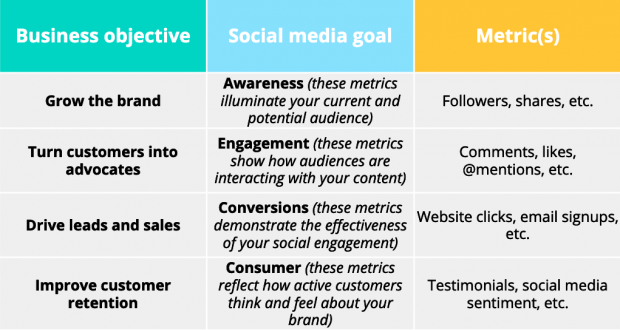
Source: Hootsuite
